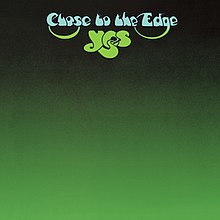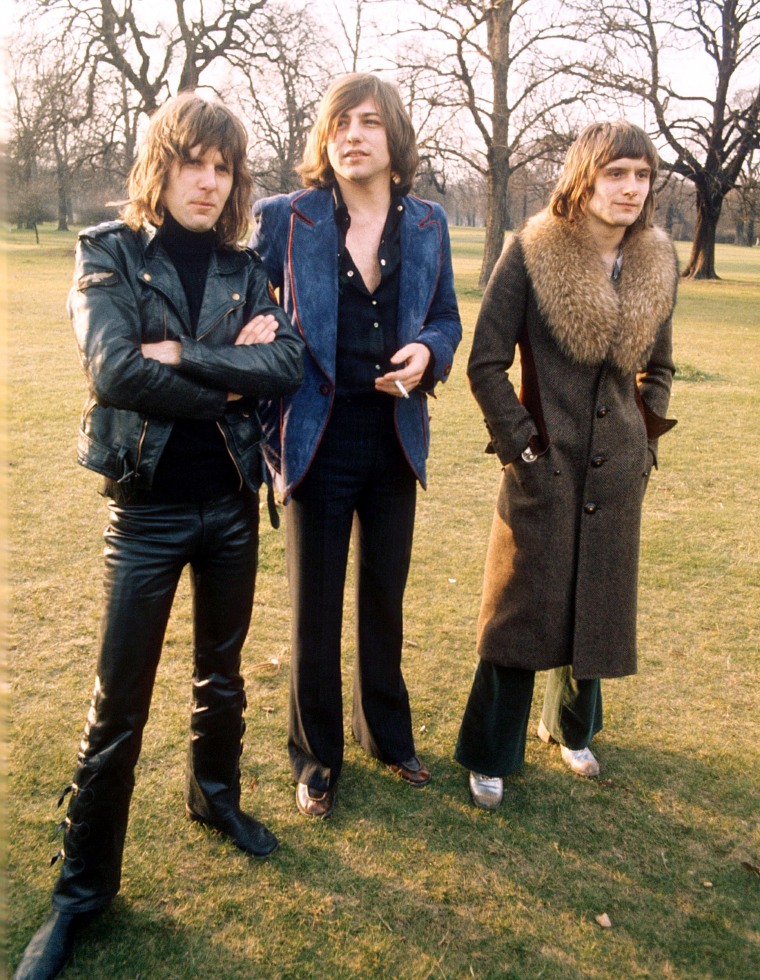Should an artistic goal be defined by standards?
I was planning on waiting for a while before I do pieces such as theses, but to hell with it, this idea has been burning in my mind and I have to get it out there, at least in some fashion.
 For anyone who is decently familiar with music, specifically in the realms of rock music and the various sub-genres that it contains, you would have undoubtedly heard the term "progressive rock" bandied about numerous times. Bands, primarily from the United Kingdom that formed around the late 1960s, early 1970s and whose purpose was to expand the genre of rock music beyond what the music industry and the public thought the genre was capable of. Classic legacy acts such as Yes, Genesis, Pink Floyd, King Crimson, and on and on and on came forth, releasing records that were once reviled by critics but now have become cornerstones of the rock genre. The influences of these types of bands can be heard far and wide, and even your favorite artist at some point has been influences by bands from this music scene. However, what makes these bands progressive?
For anyone who is decently familiar with music, specifically in the realms of rock music and the various sub-genres that it contains, you would have undoubtedly heard the term "progressive rock" bandied about numerous times. Bands, primarily from the United Kingdom that formed around the late 1960s, early 1970s and whose purpose was to expand the genre of rock music beyond what the music industry and the public thought the genre was capable of. Classic legacy acts such as Yes, Genesis, Pink Floyd, King Crimson, and on and on and on came forth, releasing records that were once reviled by critics but now have become cornerstones of the rock genre. The influences of these types of bands can be heard far and wide, and even your favorite artist at some point has been influences by bands from this music scene. However, what makes these bands progressive?
 Now sure, progressive rock as it's popularly defined has an abundance of genre characteristics: lush instrumentation, tracks that extend for a great period of time (in many cases even taking up the whole side of a vinyl), more thoughtful lyrics than rock was originally capable of, so on and so forth. However there in lies the problem: genre characteristics. Now to me, the very last thing I think about as progressive, whether it'd be in literature, social change, and especially in music, is something defined by genre characteristics. More specifically, what people expect out of a certain band based on a label. Returning to the bands I previously mentioned, of the ones that I listed I would say that the two bands that I would call "progressive" are Pink Floyd and King Crimson. Now I'm not dissing Yes and Genesis when I make that statement, I love those bands and their catalogs hold some of my favorite albums of that period in rock history. However, I wouldn't say those bands were all that progressive; I mean yes (hah puns) they were going against the grain of what was expected out of rock music at the time, but so were many other bands in this stretch of time. During the time that Yes and Genesis were putting out their albums that have been deemed as progressive rock, there was Van Der Graaf Generator, Emerson Lake and Palmer, Jethro Tull, so on and so forth. They were very different bands, each having different music directions, but they had similarities with each other, keeping in line with these genre characteristics that are common with "progressive rock".
Now sure, progressive rock as it's popularly defined has an abundance of genre characteristics: lush instrumentation, tracks that extend for a great period of time (in many cases even taking up the whole side of a vinyl), more thoughtful lyrics than rock was originally capable of, so on and so forth. However there in lies the problem: genre characteristics. Now to me, the very last thing I think about as progressive, whether it'd be in literature, social change, and especially in music, is something defined by genre characteristics. More specifically, what people expect out of a certain band based on a label. Returning to the bands I previously mentioned, of the ones that I listed I would say that the two bands that I would call "progressive" are Pink Floyd and King Crimson. Now I'm not dissing Yes and Genesis when I make that statement, I love those bands and their catalogs hold some of my favorite albums of that period in rock history. However, I wouldn't say those bands were all that progressive; I mean yes (hah puns) they were going against the grain of what was expected out of rock music at the time, but so were many other bands in this stretch of time. During the time that Yes and Genesis were putting out their albums that have been deemed as progressive rock, there was Van Der Graaf Generator, Emerson Lake and Palmer, Jethro Tull, so on and so forth. They were very different bands, each having different music directions, but they had similarities with each other, keeping in line with these genre characteristics that are common with "progressive rock".
In my view, these bands were progressive only in a specific context of what was around at the time. Now, these bands are still terrific and I highly recommend their records, but would I call them progressive in the context of how I'm trying to describe it in this context, not necessarily. So why did I choose King Crimson and Pink Floyd as the bands that I would truly call progressive? The answer, while somewhat complicated, I hope will be easy to comprehend.
I'll first start with the slightly harder argument to construct, King Crimson. While their debut "In the Court of the Crimson King" is what I would call progressive, both in regards to the time period that it was released and even today, the band did fall into that progressive rock pattern that I claim disqualifies the notion of something being progressive. However, throughout mid portion of the seventies and even into the eighties, King Crimson would implement new styles, new elements to the music, but it would still be definitively them. Another factor as to why I claim that King Crimson is indeed progressive; the only member that has stayed consistently throughout King Crimson's run is Robert Fripp. Now while that's mainly due to Fripp's infamous perfectionism, there is something very important about this notion: even though the band members would change dramatically, you would always know it's King Crimson. In all honesty King Crimson isn't even a band, it's a mood, it's a force, it's something that is indescribable. Sure there maybe albums that might sound similar to one another, but at the same time whenever there was a major line up change, you would get a different band, a completely different approach to music, a completely different experience, while at the same time not getting a different band. That, in my eyes at least, is progressive.
 Pink Floyd is a much easier answer to give than with King Crimson. While Pink Floyd did not have revolving band members like King Crimson, they were a band that would completely change the way they would construct their records. While I can't speak for all the bands that were around at this time, the track listings are usually pretty consistent, with slight exceptions but nothing mind blowing. Long tracks, usually five or six, or sometimes two on one side but an entire side length, or other combinations that were expected of these types of bands. Pink Floyd though were way different; for example, after the unbridled success of "Dark Side of the Moon" it would be easy to just copy the track listing idea off that album and just do it for the next one. Instead, on "Wish You Were Here" they have a nine part suite that bookends the album, with the first five parts opening the album, and the last four parts concluding the album, with three tracks shorter (by comparison) tracks filling the middle section. Then on "Animals" they changed it again, and then on "The Wall", they were never willing, even in their commercial and critical golden age to stick to one format; now whether that was intentional or not, I don't know but it is something I noticed while exploring their discography. What is similar to King Crimson, is that while the band would have incredibly divergent approaches to crafting different songs, the listener would always know that it's Pink Floyd, but instead of the former band where it was a certain mood or a certain force, with Pink Floyd it definitely was the identity, the sound, which is one of the most distinct in rock music history.
Pink Floyd is a much easier answer to give than with King Crimson. While Pink Floyd did not have revolving band members like King Crimson, they were a band that would completely change the way they would construct their records. While I can't speak for all the bands that were around at this time, the track listings are usually pretty consistent, with slight exceptions but nothing mind blowing. Long tracks, usually five or six, or sometimes two on one side but an entire side length, or other combinations that were expected of these types of bands. Pink Floyd though were way different; for example, after the unbridled success of "Dark Side of the Moon" it would be easy to just copy the track listing idea off that album and just do it for the next one. Instead, on "Wish You Were Here" they have a nine part suite that bookends the album, with the first five parts opening the album, and the last four parts concluding the album, with three tracks shorter (by comparison) tracks filling the middle section. Then on "Animals" they changed it again, and then on "The Wall", they were never willing, even in their commercial and critical golden age to stick to one format; now whether that was intentional or not, I don't know but it is something I noticed while exploring their discography. What is similar to King Crimson, is that while the band would have incredibly divergent approaches to crafting different songs, the listener would always know that it's Pink Floyd, but instead of the former band where it was a certain mood or a certain force, with Pink Floyd it definitely was the identity, the sound, which is one of the most distinct in rock music history. Now, having gone through my arguments on why I consider King Crimson and Pink Floyd to be progressive (which I hope are at least strong and well supported), I feel this is a decent start to my overall argument. Some can agree, others can disagree, but I feel that this initial set up is getting me closer to understanding what makes an artist or music "progressive".
Now, having gone through my arguments on why I consider King Crimson and Pink Floyd to be progressive (which I hope are at least strong and well supported), I feel this is a decent start to my overall argument. Some can agree, others can disagree, but I feel that this initial set up is getting me closer to understanding what makes an artist or music "progressive".I'm going to do these types of discussions every now and then, and I hope you will all enjoy.
Until then, have a good morning, night, or wherever you maybe situated and make sure to listen to some damn good music.

Comments
Post a Comment